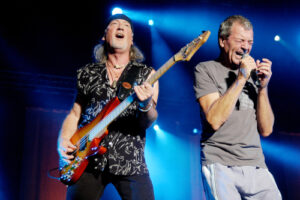
Feature Photo: bahadir aydin / Shutterstock.com
In rock music, artists have long paid homage to their peers and inspirations, weaving tributes and references into their songs. Whether as a nod to their influences, a friendly rivalry, or a way to connect with the musical tradition, these moments create a shared history that bridges generations of musicians. This article brings together ten essential rock songs that mention other musical artists, highlighting musicians’ creativity and respect for one another. Each track on this list stands out in its own right and carries the weight of a broader musical conversation.
The songs we’ve gathered for this list remind us that music is an ongoing conversation. Each artist builds upon what came before, whether in admiration, rivalry, or collaboration. In exploring these tracks, we dive into a tapestry of rock history, where every reference adds new layers to the story. By tracing these connections, we uncover not only the personal influences of the artists but also the lasting impact of rock legends on the generations that follow them.
# 10 – Jackie Wilson Said (I’m in Heaven When You Smile) – Van Morrison
Van Morrison’s “Jackie Wilson Said (I’m in Heaven When You Smile)” is a soulful homage to the legendary R&B singer Jackie Wilson, whose energetic performances and smooth vocal style greatly influenced Morrison. The song opens Saint Dominic’s Preview, Morrison’s sixth studio album, released in July 1972. With its upbeat rhythm and playful lyrics, the track captures the essence of Wilson’s dynamic stage presence. The line “Jackie Wilson said, it was ‘Reet-Petite'” directly references Wilson’s hit “Reet Petite,” a song that became a career hallmark. This nod pays tribute to Wilson’s music and serves as a bridge between Morrison’s love of rhythm and blues and his own genre-blending style.
Read More: Our 10 Favorite Van Morrison Songs
# 9 – Free Fallin’ – Tom Petty
Free Fallin’ is one of Tom Petty’s most iconic songs, released as the opening track on his debut solo album, Full Moon Fever, in 1989. Co-written with Jeff Lynne of Electric Light Orchestra fame, the song captures a feeling of emotional release with its laid-back Southern California vibe and soaring chorus. The track, written and recorded in just two days, became a defining moment in Petty’s career, showcasing his ability to craft a deceptively simple yet deeply resonant anthem. The song reached number seven on the Billboard Hot 100 and became one of Petty’s longest-charting hits. Its enduring appeal was further solidified by high-profile performances at the 1989 MTV Video Music Awards and the 2008 Super Bowl XLII Halftime Show.
Read More: Top 10 Tom Petty Songs
# 8 – All The Young Dudes – Mott The Hoople
“All the Young Dudes” stands as one of the most iconic glam rock anthems, written by David Bowie and released by Mott the Hoople in 1972. Bowie offered the song to the band after they initially turned down his “Suffragette City,” a move that would change their trajectory from potential disbandment to becoming glam rock pioneers. Recorded at Olympic Studios in London and produced by Bowie himself, the track helped Mott the Hoople gain international recognition. It peaked at number three on the UK Singles Chart and solidified their status in the glam rock movement.
The song features an array of cultural references, but perhaps the most significant is the direct mention of British glam rock icons T. Rex. In the verse, “Television man is crazy, saying we’re juvenile delinquent wrecks / Oh, man, I need TV when I’ve got T. Rex,” the lyrics reflect the influence of Marc Bolan and T. Rex on the youth of the time. Bowie’s lyrics capture the rebellious and carefree attitude of the glam rock era, and by referencing T. Rex, the song connects the spirit of rock rebellion to its contemporary musical heroes. This nod to T. Rex not only emphasizes their cultural influence but also ties “All the Young Dudes” to the broader tapestry of 1970s rock music.
Read More: Top 10 Mott The Hoople Songs
# 7 – We’re An American Band – Grand Funk Railroad
“We’re an American Band” is one of Grand Funk Railroad’s most iconic tracks, released as a single on July 2, 1973, and featured on their album of the same name. Written by drummer Don Brewer and produced by Todd Rundgren, the song was a turning point for the band, marking their first-ever number-one hit on the Billboard Hot 100. This hard-driving anthem is a celebration of life on the road and captures the wild, carefree essence of rock and roll touring life, making it an enduring classic.
A standout moment in the lyrics is the mention of blues legend Freddie King. Brewer sings, “Up all night with Freddie King, I got to tell you, poker’s his thing,” giving a nod to the famous guitarist, who was known not only for his electric blues prowess but also for his love of card games. This shoutout is a fitting tribute to King, as Grand Funk Railroad often toured with various blues and rock musicians during the 1970s. The mention of King roots the song in the culture of 1970s rock, blending Grand Funk’s hard rock style with the legacy of blues musicianship.
Read More: Complete List Of Grand Funk Railroad Band Members
# 6 – We Didn’t Start The Fire – Billy Joel
Billy Joel’s We Didn’t Start the Fire is a monumental track from his 1989 album Storm Front. Released as a single on September 18, 1989, this rapid-fire song chronicles significant political, cultural, and social events between 1949 and 1989, the years spanning Joel’s life up to the song’s release. With its stream-of-consciousness delivery and dense list of historical references, We Didn’t Start the Fire became a number one hit on the Billboard Hot 100 and remains one of Joel’s most memorable songs.
The song name-checks several iconic musical artists who had a profound impact on the cultural landscape. Joel references Buddy Holly, one of rock and roll’s pioneers, in the line “Buddy Holly, Ben Hur, space monkey, mafia.” Buddy Holly, known for hits like “That’ll Be the Day” and “Peggy Sue,” was one of the first rock stars to blend rock, country, and pop music, and his death in a tragic 1959 plane crash marked a turning point in rock history. Holly’s influence resonates deeply in rock music, and his name here reflects his role in shaping the genre’s early days.
Joel also mentions Elvis Presley, the King of Rock and Roll, in the lyric, “Davy Crockett, Peter Pan, Elvis Presley, Disneyland.” Presley’s groundbreaking presence in the 1950s popularized rock and roll and turned him into a global icon. His provocative dance moves and smooth vocals broke new ground in entertainment, sparking a revolution in both music and pop culture. Elvis’s influence on music is immense, and his mention in the song highlights how central he was to the development of rock and roll during its formative years.
Chubby Checker is another musical figure who finds his place in the song’s lyrics with the line, “U2, Syngman Rhee, Payola and Kennedy, Chubby Checker, Psycho, Belgians in the Congo.” Chubby Checker became famous for his song “The Twist,” which ignited a global dance craze in the early 1960s. Checker’s contribution to pop culture through dance music solidified his place in rock history, and his mention reflects the explosion of new dance trends and the connection between music and youth culture.
Bob Dylan, one of the most influential songwriters of all time, is also mentioned with the line “Hemingway, Eichmann, ‘Stranger in a Strange Land’, Dylan, Berlin, Bay of Pigs invasion.” Dylan’s impact on music extends far beyond folk and rock, with his socially conscious lyrics and storytelling reshaping how music was written in the 1960s. His songs such as “Blowin’ in the Wind” and “The Times They Are a-Changin'” became anthems for civil rights and anti-war movements, marking Dylan as a voice for change during one of the most turbulent periods in American history.
Lastly, U2 is referenced with the line “U2, Syngman Rhee, Payola and Kennedy.” By the time We Didn’t Start the Fire was released, U2 had already cemented themselves as one of the biggest rock bands in the world. Their politically charged albums like The Joshua Tree and War made them not just rock stars but voices of activism, using their platform to address social and political issues worldwide.
By including these influential musicians, Joel ties the evolution of music into the broader social and political narrative he weaves throughout the song. We Didn’t Start the Fire stands as a historical document of sorts, encapsulating not just global events but the immense influence of these artists on culture and society.
Read More: Top 10 Billy Joel Songs
# 5 – Do You Remember Rock ‘n’ Roll Radio? – The Ramones
Do You Remember Rock ‘n’ Roll Radio? by The Ramones is a nostalgic yet critical anthem from their 1980 album End of the Century, produced by Phil Spector. Released as a single on May 16, 1980, this song marks a significant shift in The Ramones’ sound, reflecting Spector’s lush, layered production style, which included saxophones and organs alongside the band’s usual punk rock instrumentation of guitars, drums, and bass. While The Ramones were renowned for their straightforward punk ethos, this song ventures into a more polished territory, paying tribute to rock’s golden age while lamenting the decline of the genre in the mainstream.
The song is packed with references to key figures and media in rock history, including several musical artists who influenced The Ramones. Murray the K, a famous disc jockey known as the “fifth Beatle” for his early promotion of the band, is mentioned in the line, “Do you remember Murray the K, Alan Freed, and high energy?” Alan Freed, another iconic DJ, was instrumental in popularizing the term “rock and roll.” These figures represent a time when radio was at the forefront of shaping rock music, a period The Ramones deeply cherished.
The song also highlights specific artists who left a lasting mark on rock and roll. Jerry Lee Lewis, one of the early rock pioneers known for his wild piano style, is named in the line, “Will you remember Jerry Lee?” John Lennon and T. Rex, two acts that helped define the British Invasion and glam rock eras, respectively, are also honored in the lyrics. Additionally, Moulty, the drummer from The Barbarians known for his unique one-handed playing, is referenced by his nickname: “Will you remember Ol’ Moulty?” These mentions emphasize the variety and creativity that once thrived in rock music, contrasting with The Ramones’ belief that by the end of the 1970s, much of rock had become homogenized and commercialized.
Read More: 11 Essential Ramones Songs
# 4 – Smoke On The Water – Deep Purple
“Smoke on the Water” is one of Deep Purple’s most iconic songs. It was featured on their 1972 album Machine Head. The song vividly retells an actual event in Montreux, Switzerland, during the album’s recording. The lyrics recount a fire that broke out during a Frank Zappa and The Mothers of Invention concert at the Montreux Casino. The song became a signature for Deep Purple and immortalized the infamous fire.
The lyrics mention fellow musician Frank Zappa directly in the line: “Frank Zappa and the Mothers were at the best place around, but some stupid with a flare gun burned the place to the ground.” This reference to Zappa highlights his presence at the event, as he and his band were performing when a flare gun caused the fire that destroyed the casino. The lyrics detail how this chaotic event unfolded, forcing the band to find a new location to record their album. This real-life incident became one of rock music’s most memorable and enduring stories.
Musically, the song features one of the most recognizable guitar riffs in rock history, composed by Ritchie Blackmore. The entire band lineup of Ian Gillan (vocals), Roger Glover (bass), Jon Lord (Hammond organ), Ian Paice (drums), and Blackmore came together to create a powerful, hard-hitting track. The “Rolling truck Stones thing” refers to the Rolling Stones’ mobile recording studio, which the band used to complete the album at the Grand Hotel after the fire.
Read More: Ian Paice of Deep Purple: The ClassicRockHistory.com Interview
# 3 – Sweet Home Alabama – Lynyrd Skynyrd
“Sweet Home Alabama,” released by Lynyrd Skynyrd in 1974 on their second studio album Second Helping, is one of the most well-known Southern rock anthems. Written as a direct response to Neil Young’s critical songs “Southern Man” and “Alabama,” Lynyrd Skynyrd sought to defend the South from what they perceived as an overly broad condemnation of the region. The band directly mentions Neil Young in the lyrics: “Well, I heard Mr. Young sing about her / Well, I heard ol’ Neil put her down / Well, I hope Neil Young will remember / A Southern man don’t need him around anyhow.”
The mention of Young solidified the song as a pointed reply, but instead of igniting a rivalry, it became part of rock lore. Neil Young himself later admitted that his songs were overly accusatory and even praised “Sweet Home Alabama” as a great record. This friendly acknowledgment helped defuse any potential feud, making the lyrical exchange between Lynyrd Skynyrd and Neil Young a fascinating moment in rock history. The interplay between these artists created one of rock’s most iconic crossovers, making “Sweet Home Alabama” a natural fit for this list of songs that mention other musicians.
Recorded at Studio One in Doraville, Georgia, the song features the classic Lynyrd Skynyrd lineup: Ronnie Van Zant on vocals, Ed King on lead guitar (who also wrote the famous riff), Gary Rossington and Allen Collins on rhythm guitars, Leon Wilkeson on bass, Billy Powell on piano, and Bob Burns on drums. Producer Al Kooper helped shape the album, which catapulted the band into mainstream success. “Sweet Home Alabama” reached number eight on the Billboard Hot 100, making it their highest-charting single at the time.
Read More: Complete List Of Lynyrd Skynyrd Albums And Songs
# 2 – Rock Show – Paul McCartney & Wings
“Rock Show,” the opening track of Venus and Mars by Paul McCartney & Wings, is a high-energy tribute to the spectacle and excitement of live rock performances. Released in May 1975, Venus and Mars was McCartney’s follow-up to the massively successful Band on the Run and continued the momentum of his post-Beatles career. The song is filled with references to iconic rock venues and musicians, celebrating the vibrant culture of rock concerts in the 1970s.
One of the most notable name-drops in “Rock Show” is the mention of Jimmy Page, the legendary guitarist of Led Zeppelin. In the lyrics, McCartney sings, “It looks a lot like the one used by Jimmy Page / It’s like a relic from a different age.” This line alludes to Page’s mastery of the guitar and the aura of mystery and power that surrounded him during live performances, making it a perfect reference for a song celebrating rock music’s larger-than-life moments. McCartney also pays homage to a wide array of rock venues, from Madison Square Garden in New York City to the Hollywood Bowl in Los Angeles, highlighting how rock and roll had become a global phenomenon.
The song was recorded in sessions that took place in various locations, including London, New Orleans, and Los Angeles between November 1974 and early 1975. The lineup for Venus and Mars featured McCartney on vocals, bass, and guitar, his wife Linda McCartney on keyboards, Denny Laine on guitar, Jimmy McCulloch on lead guitar, and Joe English, who joined the band during the recording process, on drums. The album, produced by McCartney, also marked a shift in Wings’ sound, as they explored a more polished and expansive style.
“Rock Show” reached audiences both through its release on Venus and Mars and as part of Wings’ worldwide tour, where it became a highlight of their live performances. The song’s lyrics, which also reference legendary rock shows at the Concertgebouw and the Rainbow, celebrate not only the power of rock music but also the cultural landmarks that have become synonymous with it. This celebratory tone and its nods to rock icons like Jimmy Page make “Rock Show” an essential song in the rock canon, linking it to both McCartney’s legacy and the history of rock music itself.
Read More: Top 10 Paul McCartney & Wings Songs
# 1 – Thunder Road – Bruce Springsteen
“Thunder Road,” the opening track of Bruce Springsteen’s 1975 album Born to Run, is one of the most celebrated songs in rock history. It has become synonymous with Springsteen’s work and is regarded as an invitation into his musical world, setting the stage for the rest of the album. Though it was never released as a single, it is often cited as one of Springsteen’s greatest achievements. The song blends poetic lyrics with vivid imagery and reflects the desires and struggles of its characters. It is a coming-of-age tale set against the backdrop of escape and redemption.
One of the most significant references in “Thunder Road” comes early in the song, when Springsteen sings, “Roy Orbison’s singing for the lonely.” This line not only sets the song’s emotional tone, with Springsteen aligning his protagonist with the “lonely,” but also serves as a nod to one of Springsteen’s musical heroes. Orbison, known for his haunting voice and songs of love and heartache, embodies the emotional landscape that Springsteen seeks to evoke in “Thunder Road.” This reference ties into the broader themes of isolation, longing, and dreams of escape that dominate the track. In a way, it aligns with the lyrical sentiment in other songs mentioned in this article, such as Van Morrison’s “Jackie Wilson Said,” where a reference to another artist connects the emotional experience of the song to a broader musical history.
The “Thunder Road” recording occurred between April and July 1975 at 914 Sound Studios in Blauvelt, New York, and later at The Record Plant in Manhattan, after music critic and producer Jon Landau officially joined the production team. The final version features Springsteen’s E Street Band contributions, including Clarence Clemons on saxophone, Garry Tallent on bass, Max Weinberg on drums, and Roy Bittan on piano. The track was shaped by the astute arrangements of Landau, whose input helped the song progress from its earlier incarnation, “Wings for Wheels,” into the rock masterpiece it became. Springsteen’s lyrics capture the determination of the song’s protagonist, who invites his love interest, Mary, to leave behind their small-town struggles for the chance at a better life.
Read More: Complete List Of Bruce Springsteen’s E Street Band Members
Check out similar articles on ClassicRockHistory.com Just click on any of the links below……
10 Most Hypnotic Songs In Rock Music
Classic Rock Band Names And The Stories Behind Them
10 Most Passionate Rock Songs About Peace
Our 10 Favorite Final Albums Released By Classic Rock Artists
Top 10 Southern Rock Live Albums Of All Time
Seven Killer Metal Albums You May Have Never Heard
The Rolling Stones 24 Tour Rocks MetLife Stadium Review 5-23-24
Ten 90s Bands Thats Sounded Like 70s Bands
Read More: Artists’ Interviews Directory At ClassicRockHistory.com
Read More: Classic Rock Bands List And Directory
Updated January 9, 2026
10 Essential Rock Songs That Mention Other Musical Artists article published on Classic RockHistory.com© 2026
Classicrockhistory.com claims ownership of all its original content and Intellectual property under United States Copyright laws and those of all other foreign countries. No one person, business, or organization is allowed to republish any of our original content anywhere on the web or in print without our permission. All photos used are either public domain Creative Commons photos or licensed officially from Shutterstock under license with ClassicRockHistory.com. All photo credits have been placed at the end of the article. Album Cover Photos are affiliate links and the property of Amazon and are stored on the Amazon server. Any theft of our content will be met with swift legal action against the infringing websites.







![Machine Head [CD]](http://m.media-amazon.com/images/I/51Th2pnwMeL._SL500_.jpg)











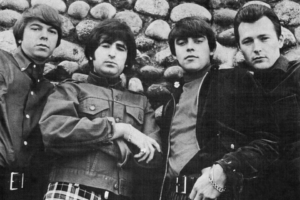
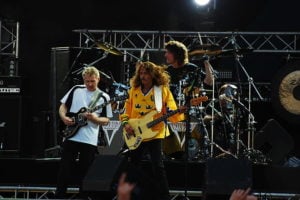
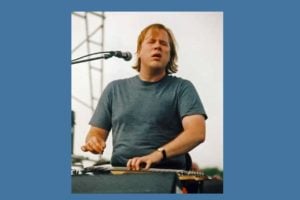
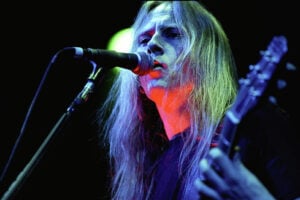



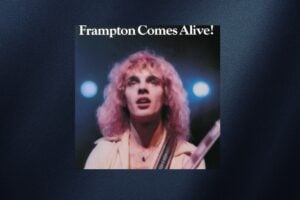
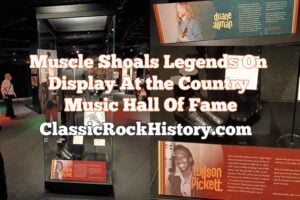
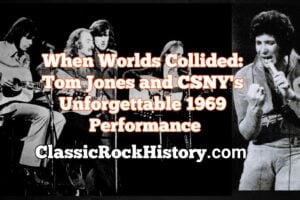

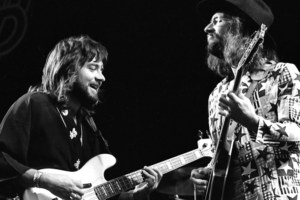
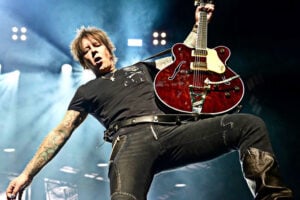
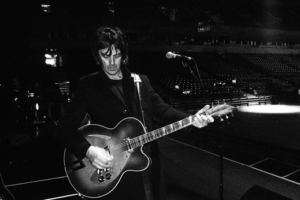













Just Like Ronnie Sang…. (Be My Little Baby) – “Take Me Home Tonight”, from Eddie Money, name checking Ronnie Spector, as well as some accompaniment from Ms. Spector